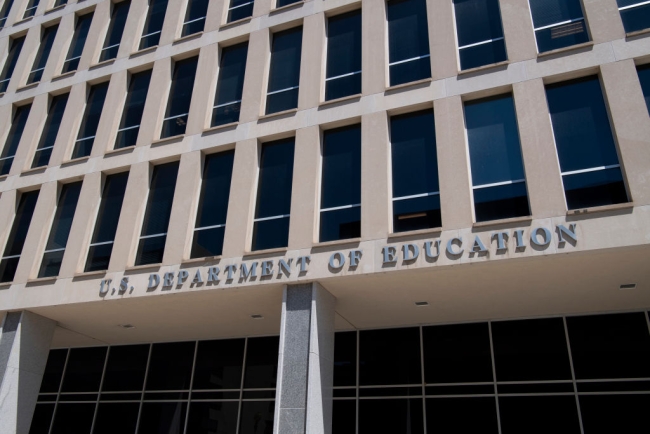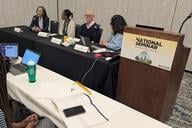You have /5 articles left.
Sign up for a free account or log in.

The Education Department has already opened 14 more Title VI investigations this year, including five this week.
Caroline Brehman/CQ-Roll Call Inc./Getty Images
At the University of Minnesota in October, some faculty members were allowed to post statements in support of Palestinian people on official university websites—a decision that, along with other incidents, a law professor and former regent say warrants a federal civil rights investigation.
The Education Department appears to have agreed, adding Minnesota to its growing list of institutions under investigation for potential violations of Title VI of the Civil Rights Act of 1964, which requires federally funded institutions to protect students from discrimination based on race, color or national origin. The department has said that law also protects against discrimination based on shared ancestry, which includes antisemitism or Islamophobia.
The law professor and former regent wrote in a complaint to the department that an investigation “could help alleviate an increasingly oppressive academic atmosphere for our students.” Among other examples, they cited an incident in which a Jewish faculty member was “accosted” while filming a “pro-Hamas rally,” the Star Tribune reported.
Since the start of the Israel-Hamas war, the Education Department has launched 51 investigations into complaints alleging discrimination based on shared ancestry—33 of which involve a college or university—and not yet resolved any. Over all, the department has 99 open investigations related to Title VI shared ancestry violations that date back to 2016, meaning most were initiated in the wake of the Oct. 7 Hamas attack on Israel.
The department’s pace isn’t letting up in the new year. This month, the agency’s Office for Civil Rights has already announced 14 new investigations—nearly half of the new inquiries that were started last fall. This week, Temple University, Ohio State University and Muhlenberg College were added to the list, along with a second investigation into the University of Illinois at Chicago—bringing the number of institutions currently under investigation to 18.
The OCR has taken a number of steps to address the recent “alarming rise” in reports alleging antisemitism, Islamophobia and other bias incidents. That includes publicizing the institutions and school districts under investigation.
“They certainly seem to be trying to get the word out about these complaints and about the fact that they are open for business,” said Kenneth Marcus, the founder of the Louis D. Brandeis Center for Human Rights Under Law, which has filed several complaints with the Education Department.
Marcus, who oversaw the OCR during the Trump administration, said that while the department has been quick to open investigations, he’s not seeing the same promptness when it comes to closing the inquiries. The first investigations were announced in mid-November. The lack of resolution is “becoming problematic,” he said.
“It would make an even bigger difference if OCR were closing more of these complaints with changes, but the mere fact that they’re opening them and providing transparency is helpful,” he said.
The Education Department said it does not comment on pending investigations.
Marcus acknowledged that the department is dealing with a large volume of complaints, which is slowing OCR down.
“If they don’t move more quickly, the problem is only going to worsen as more complaints come in,” he said. “We filed another complaint this morning and are looking at a number of others in the near future.”
The department doesn’t specify what the investigations are about, other than a possible shared-ancestry violation. However, media reports and civil rights complaints offer hints into what the OCR could be looking at.
At Temple University, the editor in chief of Campus Reform, a self-described “conservative watchdog to the nation’s higher education system,” filed a complaint that accused the university of discriminating against Jewish students by failing to respond to incidents of harassment during the current academic year. The complaint said that Jewish students “are increasingly unwelcome, unsafe, and discriminated against” at Temple.
The editor cited the use of the phrase “from the river to the sea” at protests in support of Palestinian people. Campus Reform further pointed to a December protest organized in part by Temple Students for Justice in Palestine at which demonstrators gathered outside an Israeli restaurant, Goldie, and accused the establishment of supporting genocide.
A Temple spokesperson said in a statement to local media that the university will comply with the investigation.
“Temple University unequivocally condemns hate and discrimination against any person and will always strive to ensure that all of our students, faculty, and staff feel welcomed and safe in our community and throughout our campus,” the statement said. “As this situation evolves, the university will continue to adapt, ensuring that all members of this community have access to the support and resources that they need.”
At Ohio State University, two students were assaulted in November and the Hillel Center was vandalized. Students in a Jewish fraternity said in December that people yelled antisemitic phrases outside their house and threw items at the building, which wasn’t the group’s main house. Meanwhile, at Muhlenberg College in Allentown, Pa., some alumni wanted a professor removed after she made statements that in their view glorified Hamas and “jeopardized the physical and psychological safety of the Jewish students on campus.”
In its investigations, OCR is typically focused on how the universities responded to the reports of harassment or discrimination and whether those responses comply with federal law. Resolutions of these open inquiries will offer more insights in how the agency interprets the law; however, OCR investigations typically take months and involve interviews and data requests.
Depending on what OCR finds, the investigations could result in a university losing access to federal funds, though such a step would be unprecedented.




